

An addendum is a thing to be added; an addition. For example, it may be used to add supplemental terms or conditions to a contract or make corrections or supply omissions to a document. An addendum is often used to supply additional terms to standardized contracts, such as leases. Addendum is singular; the plural form is addenda.
Real propertysales agreements often have addenda (plural of addendum) as the buyer and seller negotiatefine points (how payments will be made, what appliances will be included, date of transfer oftitle, the terms of financing by the seller and the like). Although often they are not, addendashould be signed separately and attached to the original agreement so that there will be noconfusion as to what is included or intended.
The Michigan Addendum to Real Estate Purchase and Sale Agreement is a legal document that is used to modify, clarify, or add specific terms and conditions to the original Purchase and Sale Agreement in a real estate transaction in the state of Michigan. This addendum ensures that both the buyer and seller have a clear understanding of any additional terms or obligations that may be unique to the transaction. There are several types of Michigan Addendum to Real Estate Purchase and Sale Agreement that may be used depending on the specific circumstances of the transaction. Some commonly used Michigan Addendums include: 1. Financing Addendum: This addendum is used when the buyer needs to secure financing to complete the purchase. It outlines the specific terms and conditions related to the financing, such as the type of loan, interest rate, down payment, and any contingencies related to loan approval. 2. Inspection Addendum: This addendum is used to outline the process and timeline for the property inspection. It includes details on the inspection type, who will conduct it, any specific areas to be inspected, and any remedies or negotiations that may arise from the inspection findings. 3. Appraisal Addendum: This addendum is used when an appraisal of the property is required to determine its value. It outlines the process and timeline for the appraisal, as well as any provisions related to the appraisal value and its impact on the purchase price. 4. Contingencies Addendum: This addendum is used to specify any additional contingencies that need to be included in the purchase agreement. These may include contingencies related to the sale of the buyer's current property, obtaining necessary permits or approvals, or any other specific conditions that need to be met before the transaction can be completed. 5. Closing Addendum: This addendum is used to outline the specific terms and conditions related to the closing process. It includes details on the date, time, and location of the closing, as well as any requirements for the transfer of funds, possession of the property, and any other related considerations. In summary, the Michigan Addendum to Real Estate Purchase and Sale Agreement is a crucial document that allows for customization and clarification of the original purchase agreement to meet the unique requirements of a real estate transaction in Michigan.
The Michigan Addendum to Real Estate Purchase and Sale Agreement is a legal document that is used to modify, clarify, or add specific terms and conditions to the original Purchase and Sale Agreement in a real estate transaction in the state of Michigan. This addendum ensures that both the buyer and seller have a clear understanding of any additional terms or obligations that may be unique to the transaction. There are several types of Michigan Addendum to Real Estate Purchase and Sale Agreement that may be used depending on the specific circumstances of the transaction. Some commonly used Michigan Addendums include: 1. Financing Addendum: This addendum is used when the buyer needs to secure financing to complete the purchase. It outlines the specific terms and conditions related to the financing, such as the type of loan, interest rate, down payment, and any contingencies related to loan approval. 2. Inspection Addendum: This addendum is used to outline the process and timeline for the property inspection. It includes details on the inspection type, who will conduct it, any specific areas to be inspected, and any remedies or negotiations that may arise from the inspection findings. 3. Appraisal Addendum: This addendum is used when an appraisal of the property is required to determine its value. It outlines the process and timeline for the appraisal, as well as any provisions related to the appraisal value and its impact on the purchase price. 4. Contingencies Addendum: This addendum is used to specify any additional contingencies that need to be included in the purchase agreement. These may include contingencies related to the sale of the buyer's current property, obtaining necessary permits or approvals, or any other specific conditions that need to be met before the transaction can be completed. 5. Closing Addendum: This addendum is used to outline the specific terms and conditions related to the closing process. It includes details on the date, time, and location of the closing, as well as any requirements for the transfer of funds, possession of the property, and any other related considerations. In summary, the Michigan Addendum to Real Estate Purchase and Sale Agreement is a crucial document that allows for customization and clarification of the original purchase agreement to meet the unique requirements of a real estate transaction in Michigan.